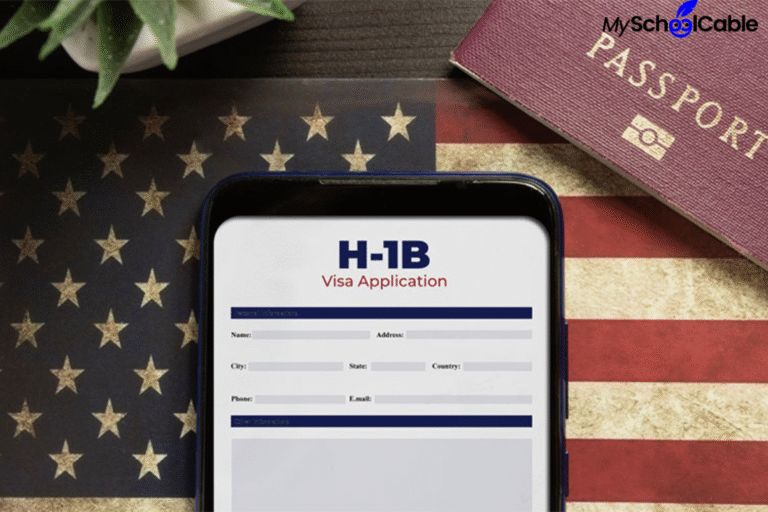Working remotely raises a lot of questions. More people are asking: Can I work for a US company and live abroad? The answer is not always straightforward. It depends on your employee status, where you’re moving, and how your company handles international employees. In this guide, we’ll go through all you need to consider before making the leap—legally, financially, and practically. Let’s get right into it!
Can I Work for a US Company and Live Abroad?

This is one of the most asked questions—and with good reason. Whether working remotely for a US company from another country is legal depends on several significant factors: your citizenship, visa status, company policies, and the laws in the country in which you’d like to live.
If You’re a US Citizen or Green Card Holder:
Yes, you can legally work for a US company from abroad. You will, however, need to comply with the local immigration laws of the country that you’re in. Most nations only allow short visits under tourist visas, which typically do not permit work—even the remote type for a foreign employer. For longer stays, you may need a visa or residence permit that expressly allows remote work, such as a digital nomad visa.
You should know that even if you are working for a US company, from abroad, you can still be in violation of local law if you are not on the correct visa.
You should read: 9 Best Countries Where U.S. Nurses Can Work Abroad in 2025
If You’re Not a US Citizen:
You don’t have to be in the US to be employed by a US company, but your eligibility is contingent upon your employer being open to international hiring. If you’re in your home country or anywhere else, the company might have to employ you as an independent contractor or bring you on board using an Employer of Record (EOR) service to remain in compliance with labor laws.
Now, what are the things you should consider?
- Local labor legislation: Some countries consider any work done on their soil to be subject to their labor legislation, even for foreign employers.
- Corporate risk: Your presence can trigger “permanent establishment” concerns, which may expose your employer to foreign taxation or compliance.
- Visa/residency: You can be fined or deported for working on a tourist visa. Always legalize your stay.
Tip: Consult with an immigration attorney or global employment specialist prior to making a move for remote work.
You should read: 9 Best Countries Where U.S. Nurses Can Work Abroad in 2025
Benefits of Working for a US Company from Another Country?
There’s a reason remote work has turned global. Done appropriately, working for an American employer abroad offers outstanding personal and professional advantages—especially if you are being paid in USD and living in a lower-cost region.
Potential for Higher Earnings
Many US companies pay salaries based on US market rates. If you’re living in a country with a lower cost of living, your income can stretch much further, allowing for savings, travel, and a higher quality of life.
Flexible Lifestyle & Work-Life Balance
Remote work lets you set your own schedule, avoid long commutes, and work from any location with internet access. Living abroad can bring a slower pace of life, better weather, or simply a lifestyle that aligns more closely with your values.
You should read: Earn $100K From Home: 8 High-Paying Remote Jobs (2025)
Cultural Enrichment and Personal Growth
Living abroad introduces you to new cultures, languages, and experiences. It’s a personal development experience that also renders you more flexible and world-aware—traits that employers love.
Geo-Arbitrage Opportunities
This catchy concept is all about making the most of a good salary in a strong currency (like USD) while working remotely from a low-cost country. Mexico, Thailand, or Portugal allow remote professionals to live a good life at an affordable price.
Career Benefit and Global Networking
Remote work from different geographies can offer new opportunities. You can meet professionals from different backgrounds, access new markets, and enrich your CV with international experience.
Tip: Maintain a professional calendar, even in paradise. Performance, not location, is what’s valued by employers.
You should read: Top 20 Best Art Courses in Nigeria
5 Must-Know Facts About Working for a US Company While Living Abroad
Before you stuff your bags and make a reservation on a flight, there are some tough facts to know. Working remotely for an American business in another country is the stuff dreams are made of—but forgetting the fine print can turn it into a nightmare experience. These are five facts that will prepare you for global remote work in real life.
You Can Still Be Asked to Pay US Taxes (Despite Being Overseas)
If you are a Green Card holder or a US citizen, you’re actually required to submit a federal tax return each year—wherever you’re worldwide. The IRS taxes your worldwide income, and that means the income you earn while overseas.
You may, however, qualify for tax relief including:
- Foreign Earned Income Exclusion (FEIE): Excludes up to ~$120,000 (annually adjusted) from US taxable income if you meet the bona fide residence or physical presence test.
- Foreign Tax Credit (FTC): Credits foreign country income tax paid.
You’ll still have to complete IRS forms correctly—leaving them out can lead to penalties. Most expats employ CPAs who specialize in expat tax returns.
You should read: How to Check JAMB Result Online | Step-by-Step Guide
Not All US Businesses Allow International Remote Work
Just because you are allowed to work remotely from overseas does not necessarily mean your employer is happy with that. Some companies have policies which prohibit employees from working outside of the US due to:
- Compliance risks
- Time zone issues
- Insurance and payroll difficulties
Ensure that you get a written approval from HR before traveling abroad. Some companies only allow short trips abroad or contractor arrangement in case you’re working overseas on a long-term position.
You should read: Professional Courses in Nigeria
Visa and Residency Regulations Totally Matter
This is where most remote workers trip up. Working abroad without the proper visa or residency status is illegal in many countries—even if you’re working for a foreign (US-based) employer and getting paid in the US.
Let’s break this down:
Tourist Visas are NOT Work Visas
You can’t work legally—yes, even remote work—on a tourist visa in countries like most others. That’s Spain, Indonesia, and Thailand, where quite a few remote workers have the wrong idea. Immigration officers actually do check email accounts and laptops.
You Could Be Deported or Fined
Working illegally or overstaying your visa may result in deportation, bans, or fines. In extreme situations, it may even initiate investigations for your employer if local authorities crack down.
Digital Nomad Visas Are a Safer Option
More than 40 countries offer remote work or “digital nomad” visas for people who work for global companies. Such visas usually allow stays of between 6 months and 2 years, depending on the country, and often have requirements to prove income and health insurance.
Examples of digital nomad-friendly countries:
- Portugal
- Estonia
- Costa Rica
- Barbados
- Croatia
Always research your host country’s visa and tax policies before you move.
You should read: 4 Years Science Courses in Nigeria
Your Job Status Can Be Altered at Any Time
Many US employers are unable or unwilling to keep foreign workers on their payroll as full-time W-2 employees for compliance, tax withholding, and benefits administration purposes.
They might in these cases:
- Convert you to 1099 contractor status
- Hire you through an Employer of Record (EOR) service
- End the employment arrangement completely
Each option has its drawbacks. Contractors take care of their own taxes and benefits, but EORs give you some protection and legality—but may nibble at your take-home pay.
Health Insurance and Benefits May Not Travel with You
Your US-based health insurance policy likely will not cover you abroad, other than in an emergency or on a short visit. If you’re going abroad for the long haul:
- Investigate international health insurance policies
- Or enroll in local healthcare if allowed
Also, other benefits like 401(k) matching, disability, or even paid leave policies may not be available after you move.
Read also: 24 Amazing Remote Jobs at $30/Hour With No Degree Required
Tips to Successfully Work for a US Company and still Live Abroad?

If you want to work with a US company and still live abroad, it’s all about how you prepare, communicate, and stay disciplined. Here are tips to keep you productive and stress-free as a remote US-based company employee working abroad.
Consider Your Time Zones and Synchronize with Your Team
Time difference is one of the biggest challenges when working abroad. Bali and New York, for example, would have a 12-hour time difference.
Tips:
- Use technology like World Time Buddy or Google Calendar time zone feature
- Make your availability obvious
- Try to split your day if there is little overlap (some mornings, some evenings)
You should read: International Relations Courses: A Guide for Nigerian Students
Have a Solid Internet—Always
Nothing can be more lethal to remote productivity than sketchy Wi-Fi. Before settling in:
- Take speed tests at your accommodation
- Have a mobile hotspot or buy a local SIM as a backup
- Look into coworking spaces with guaranteed internet
Protect Your Data and Your Privacy
Working remotely may leave you vulnerable to cybersecurity risks, especially when using public Wi-Fi.
Must-haves:
- Use a reliable VPN
- Enable 2FA for work accounts
- Don’t access sensitive systems through public networks without security.
You should read: No Experience? Here’s How to Get a Cybersecurity Job – 5 Hacks
Keep Communication Clear and Regular
Remote working only succeeds if there is effective communication. It is all the more critical if you are working in another time zone.
Tips:
- Use async tools like Slack, Notion, or Loom
- Hold weekly check-ins with your manager or team
- Keep your calendar current and on track
Familiarize Yourself with the. Legal Regulations Where You Are
Research. Prior to relocation:
- Visa policies (e.g., tourist visa. Vs. digital nomad visa)
- Local taxes. And. Registration
- Residency permits, health insurance policies, and emergency services
- Don’t Get the impression that “remote” means you don’t have to pay.
- Local laws.
You should read: 22 Remote Jobs That Pay Well Without a Degree (2025 Edition)
Create a Schedule. That Maintains Concentration and Adaptability
Remote. Work. Abroad has a tendency to blur the line. Between vacation and work. Create. Routine into your day:
- Set working start and finish times
- Develop a distraction-free workspace
- Erase time for personal exploration following your workday
Treat your remote work seriously—not a travel opportunity—and you’ll thrive anywhere in the world.
Check out: Top 9 Remote Jobs That Pay Weekly – No Waiting!
FAQs
This depends on the country where you will be living and its visa and residency policy.
Most US health insurance policies exclude outside the US. You will likely need further international insurance.
Generally yes, but you may qualify for exclusions or foreign tax credits. Consult with a tax professional.
Estonia, Portugal, and Mexico, which are the best locations for digital nomads, are popular because they provide ease in accessing flexible visas and infrastructure.
Doing so will possibly violate company policy or overseas employment laws. Always consult your employer.
Accept international bank deposits, Wise, or Payoneer—dependent upon contractor designation and location.
Conclusion
So to answer the question: can I work for a US company and live abroad? Yes, you can do it. It can be wonderful if you do it right.
Planning a geolocation relocation on your remote job? Consult a tax expert and your HR before you take the big step.
You should read: Top 20 Best Art Courses in Nigeria






